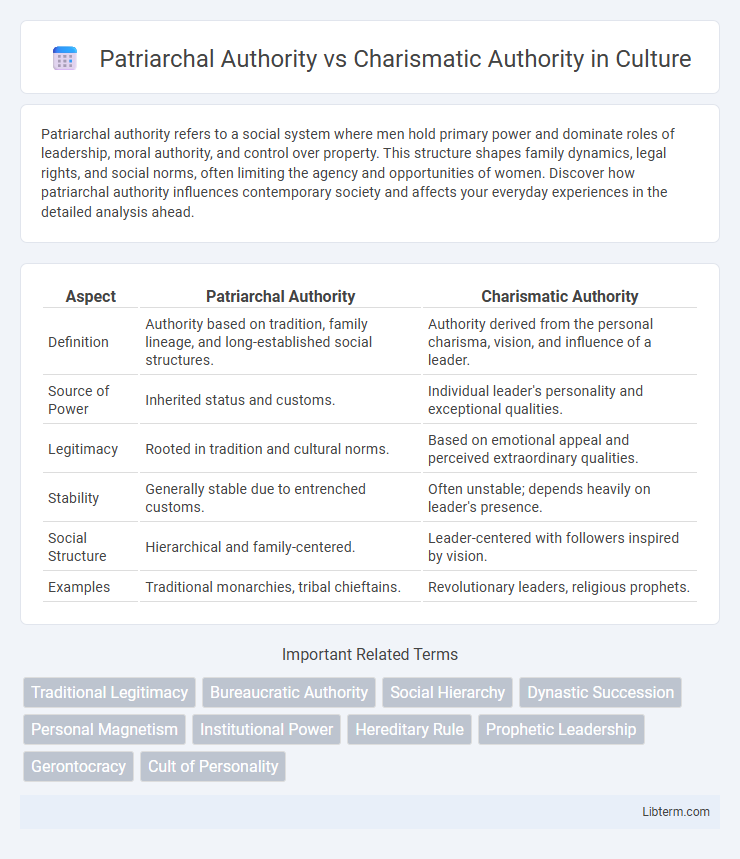Patriarchal authority refers to a social system where men hold primary power and dominate roles of leadership, moral authority, and control over property. This structure shapes family dynamics, legal rights, and social norms, often limiting the agency and opportunities of women. Discover how patriarchal authority influences contemporary society and affects your everyday experiences in the detailed analysis ahead.
Table of Comparison
| Aspect | Patriarchal Authority | Charismatic Authority |
|---|---|---|
| Definition | Authority based on tradition, family lineage, and long-established social structures. | Authority derived from the personal charisma, vision, and influence of a leader. |
| Source of Power | Inherited status and customs. | Individual leader's personality and exceptional qualities. |
| Legitimacy | Rooted in tradition and cultural norms. | Based on emotional appeal and perceived extraordinary qualities. |
| Stability | Generally stable due to entrenched customs. | Often unstable; depends heavily on leader's presence. |
| Social Structure | Hierarchical and family-centered. | Leader-centered with followers inspired by vision. |
| Examples | Traditional monarchies, tribal chieftains. | Revolutionary leaders, religious prophets. |
Understanding Patriarchal Authority
Patriarchal authority is a form of social organization where power is predominantly held by male heads of families or clans, emphasizing inherited status and traditional roles within kinship structures. This authority is maintained through established customs and rituals that legitimize male dominance and control over property, lineage, and social order. Understanding patriarchal authority involves recognizing its deep roots in historical contexts and its persistence in shaping power dynamics in many societies around the world.
Defining Charismatic Authority
Charismatic authority is defined by the personal charm and extraordinary qualities of an individual who inspires loyalty and devotion from followers, often emerging during times of social crisis. This type of authority is inherently unstable and based on the leader's perceived supernatural, heroic, or exemplary traits rather than legal rules or traditional customs. Max Weber contrasted charismatic authority sharply with patriarchal authority, which is grounded in established traditions and inherited power structures.
Historical Roots of Patriarchal Power
Patriarchal authority originates from ancient kinship systems where power was concentrated in male heads of families, embedding male dominance in social, political, and economic structures. Historical societies such as Mesopotamia, Ancient Greece, and early Confucian China institutionalized patriarchal power through legal codes and religious doctrines reinforcing male lineage and inheritance. This longstanding tradition contrasts with charismatic authority, which relies on individual leader's extraordinary personal qualities rather than inherited social roles or established norms.
Emergence of Charismatic Leadership
Charismatic authority emerges from an individual's extraordinary personal qualities and the ability to inspire devotion, contrasting with patriarchal authority which is rooted in traditional family or clan hierarchy. Max Weber identified charismatic leadership as a revolutionary force that challenges established norms by fostering loyalty based on personal trust and charisma rather than inherited status. This form of authority becomes pivotal during periods of social upheaval, enabling leaders to mobilize followers and enact significant change beyond conventional power structures.
Key Differences Between Patriarchal and Charismatic Authority
Patriarchal authority is based on traditional, hereditary, and familial ties where power is passed down within a lineage, emphasizing customs and established roles. Charismatic authority arises from an individual's exceptional personal qualities and the ability to inspire devotion, relying on perceived extraordinary leadership rather than established norms. The key difference lies in the source of legitimacy: patriarchal authority depends on tradition and inherited status, while charismatic authority is rooted in personal charisma and emotional influence over followers.
Social Impacts of Patriarchal Authority
Patriarchal authority often reinforces traditional gender roles, limiting women's opportunities in education, employment, and political participation. Societies governed by patriarchal systems tend to maintain hierarchical family and social structures that prioritize male dominance and decision-making power. This can result in systemic inequalities, persistence of gender-based violence, and restricted social mobility for marginalized groups.
Societal Effects of Charismatic Authority
Charismatic authority fosters rapid social change by inspiring followers through personal qualities and visionary leadership, often leading to the establishment of new ideologies and movements. It disrupts traditional power structures, encouraging innovation and mobilization in societies seeking transformation or crisis resolution. The intense personal loyalty it generates can unify communities but also risks instability if the leader's influence wanes or is challenged.
Case Studies: Patriarchal Figures vs Charismatic Leaders
Patriarchal authority is exemplified by leaders like Confucius, whose influence stems from hereditary lineage and traditional social structures that uphold family hierarchy and established norms. Charismatic authority, as seen in figures such as Martin Luther King Jr., is rooted in personal magnetism and inspirational leadership that mobilizes followers around ideals rather than inherited status. Case studies highlight how patriarchal figures maintain stability through continuity, while charismatic leaders drive social change through transformative vision and emotional appeal.
Authority in Modern Institutions: A Comparative Analysis
Patriarchal authority in modern institutions is often characterized by inherited power structures and traditional roles, emphasizing stability through lineage and established customs. Charismatic authority, in contrast, derives legitimacy from an individual's personal qualities and visionary leadership, driving innovation and change within organizations. Comparative analysis reveals that while patriarchal authority sustains continuity in institutional frameworks, charismatic authority fuels dynamic adaptation and transformation in response to contemporary challenges.
The Future of Authority: Shifting Paradigms
Patriarchal authority, rooted in traditional family and societal hierarchies, is increasingly challenged by charismatic authority, which derives power from individual vision and personal appeal. The future of authority lies in the dynamic interplay between enduring institutional norms and the rise of leaders who inspire change through innovation and emotional connection. Emerging paradigms emphasize adaptive leadership models that blend legitimacy from both heritage and charisma, reflecting evolving social values and digital-age transformations.
Patriarchal Authority Infographic

 libterm.com
libterm.com